You’ve never had anyone wait on you until you’ve been in the hands of the Sherpas. They are humanity’s servers. They can not do enough for you.
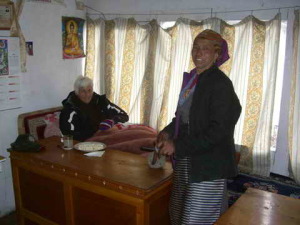 At first, being from the American South, and certainly oversensitive to anyone who might be considered a “servant,” I was disturbed by these people who walk dirt and rock paths carrying loads three times their size on their backs, some walking with Buddhist prayer beads in their hands, others with a portable radio strapped to the load listening to the latest in Nepali song. I wondered why they liked to take on such burdens being virtual trucks to get food and necessities to the rural villages of the Khumbu or to the Everest Base Camp. I’m told it’s what they chose to do.
At first, being from the American South, and certainly oversensitive to anyone who might be considered a “servant,” I was disturbed by these people who walk dirt and rock paths carrying loads three times their size on their backs, some walking with Buddhist prayer beads in their hands, others with a portable radio strapped to the load listening to the latest in Nepali song. I wondered why they liked to take on such burdens being virtual trucks to get food and necessities to the rural villages of the Khumbu or to the Everest Base Camp. I’m told it’s what they chose to do.
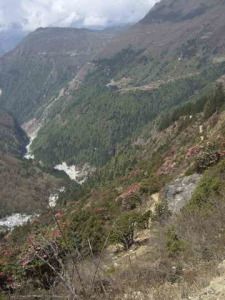 As I sit in my roadside seat (which could be a pile of stones) I watch every kind of burden that any beast might haul appearing in giant baskets or just flat on the Sherpas back, whether it is aluminum roof panels or half a yak side or enormous gallons of kerosene or three or four heavy duffle bags belonging to climbing expeditions.. You make room for them, they don’t have to make room for you. So it becomes a war between the yaks and naks (female yaks) who are used for transporting goods and the Sherpa’s carrying the same, if not bigger kind of load. You watch yaks their heads low to the ground, their backs a pleasing hump, loaded with mountaineering and climbers gear slowly carrying it up to various camps. The Sherpas do the same. At one point there was a move to helicopter materials into the Khumbu, but the Sherpas so protested – because it is their livelihood, the idea was squelched. Only extremely large pieces might be helicoptered in to Namche Bazaar but rarely even to base camp.
As I sit in my roadside seat (which could be a pile of stones) I watch every kind of burden that any beast might haul appearing in giant baskets or just flat on the Sherpas back, whether it is aluminum roof panels or half a yak side or enormous gallons of kerosene or three or four heavy duffle bags belonging to climbing expeditions.. You make room for them, they don’t have to make room for you. So it becomes a war between the yaks and naks (female yaks) who are used for transporting goods and the Sherpa’s carrying the same, if not bigger kind of load. You watch yaks their heads low to the ground, their backs a pleasing hump, loaded with mountaineering and climbers gear slowly carrying it up to various camps. The Sherpas do the same. At one point there was a move to helicopter materials into the Khumbu, but the Sherpas so protested – because it is their livelihood, the idea was squelched. Only extremely large pieces might be helicoptered in to Namche Bazaar but rarely even to base camp.
If you ever become a friend to a Sherpa and are given the hospitality and care they offer because they really are hospitable and do care, you’ll never forget it. Since I have struggled on this long and tedious trek, Jim asked his friend Nima Tashi to come along. Nima is one of the most respected Sherpas in the Khumbu and is building a lodge that he and his wife will run. Nima has summited Everest more than ten times. Then last summer he fell off a roof and landed on two feet. Now the fused foot is bothering him. So he is not doing a summit this year. I guess I’m his task. He walks beside me in the difficult ascents and descents and grabs my arm when I have to climb up slippery or oversized rocks. And since I got the chest congestion, he makes sure I’ve plenty of warmth, replenishing the hot water bottles now and then.
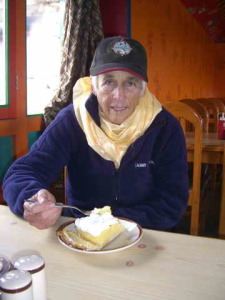 At Pamboche’s final night we went to his home for dinner. Nima came to help me get down the road to his house since I was pretty weak from the congestion. We walked upstairs to his family room which is lighted and there are the usual benches along all the walls with cushions, and rugs placed on them to make the sitting comfortable. His wife, who speaks no English, but is so anxious to make things comfortable, brought a cup of hot lemon tea and a huge plate of popcorn. Jim had told me that you cannot deny their generosity. She and Nima had found two huge velvet blankets that must have weighed twenty pounds to wrap me in, then put pillows behind my head and then watched while I downed the popcorn. They never eat while their guest are eating, which is embarrassing to me as well. But I dug in and in no time I was so warm and comfortable I fell asleep. They just watched. When I awoke from the doze, Nima’s wife showed me how she spins yak wool into yarn with a spindle. She then offered me two skeins she had spun before preparing the dinner.
At Pamboche’s final night we went to his home for dinner. Nima came to help me get down the road to his house since I was pretty weak from the congestion. We walked upstairs to his family room which is lighted and there are the usual benches along all the walls with cushions, and rugs placed on them to make the sitting comfortable. His wife, who speaks no English, but is so anxious to make things comfortable, brought a cup of hot lemon tea and a huge plate of popcorn. Jim had told me that you cannot deny their generosity. She and Nima had found two huge velvet blankets that must have weighed twenty pounds to wrap me in, then put pillows behind my head and then watched while I downed the popcorn. They never eat while their guest are eating, which is embarrassing to me as well. But I dug in and in no time I was so warm and comfortable I fell asleep. They just watched. When I awoke from the doze, Nima’s wife showed me how she spins yak wool into yarn with a spindle. She then offered me two skeins she had spun before preparing the dinner.
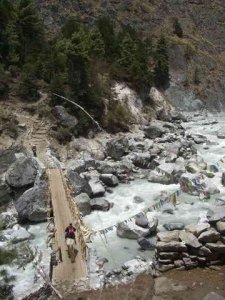 When Jim, Karen, and Brad arrived, they were cold and wet from the all afternoon rain. The meal was huge. Potato pancakes, fried potatoes with vegetables, pot stickers, a huge rice dish, and all the whiskey in the house. They fixed hamburgers from yak steaks, and then for me a tomato and cheese pizza which was honest as pizza can get. Then dinner was topped off with apple pie and rice pudding made with yak milk. This is the kind of dinners served in Sherpa homes. And they don’t stop serving until it’s all gone. Then came the presenting of blessing katas or scarves – the golden on white silk ones which are wrapped around your neck with a holy blessing. By the time everyone finished – Nima, his wife, his wife’s brother – our necks were loaded with the silk scarves and we were feeling well, full and blessed. When it was time to walk back to the lodge, Nima grabbed my arm and his headlamp to make sure I got back safely, then made sure I had two hot water bottles, and water to drink, and was covered fully with two huge velvet bedspreads. Since he wears a hearing aide, he often doesn’t understand what I say. But he smiles all the time, and either Nima or Jeta, our other head guide, are the first to knock on the door in the morning with a cup of hot lemon tea and a menu to select what I want for breakfast.
When Jim, Karen, and Brad arrived, they were cold and wet from the all afternoon rain. The meal was huge. Potato pancakes, fried potatoes with vegetables, pot stickers, a huge rice dish, and all the whiskey in the house. They fixed hamburgers from yak steaks, and then for me a tomato and cheese pizza which was honest as pizza can get. Then dinner was topped off with apple pie and rice pudding made with yak milk. This is the kind of dinners served in Sherpa homes. And they don’t stop serving until it’s all gone. Then came the presenting of blessing katas or scarves – the golden on white silk ones which are wrapped around your neck with a holy blessing. By the time everyone finished – Nima, his wife, his wife’s brother – our necks were loaded with the silk scarves and we were feeling well, full and blessed. When it was time to walk back to the lodge, Nima grabbed my arm and his headlamp to make sure I got back safely, then made sure I had two hot water bottles, and water to drink, and was covered fully with two huge velvet bedspreads. Since he wears a hearing aide, he often doesn’t understand what I say. But he smiles all the time, and either Nima or Jeta, our other head guide, are the first to knock on the door in the morning with a cup of hot lemon tea and a menu to select what I want for breakfast.
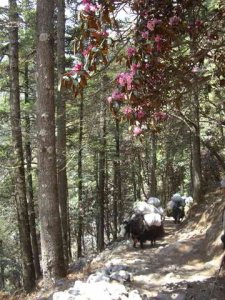 The clue to successful trekking is drinking plenty of water, eating plenty of energy food, and having a good Sherpa. While you struggle to move up or down to incredibly steep hills, they make sure you don’t fall and that you drink liters of water all the time. Nima and Jeta carry backpacks with the necessities for me. And when I cannot go another inch, they have the water bottle ready and a sack of cookies or a slice of cheese. Now we are on our return route, I didn’t realize how hard it had been. We are going down what last week we went up. We are also going much longer distances since we are supposed to be better fit and the lowering of altitude should make us more comfortable whether we are ascending or descending. It’s all still hard for me but today en route back to Namche Bazaar, thousands of rhododendron trees were in fresh bloom – from yellow, to white, to dark red and pink. Miniature blue tiger iris grew wild straight from the soil.
The clue to successful trekking is drinking plenty of water, eating plenty of energy food, and having a good Sherpa. While you struggle to move up or down to incredibly steep hills, they make sure you don’t fall and that you drink liters of water all the time. Nima and Jeta carry backpacks with the necessities for me. And when I cannot go another inch, they have the water bottle ready and a sack of cookies or a slice of cheese. Now we are on our return route, I didn’t realize how hard it had been. We are going down what last week we went up. We are also going much longer distances since we are supposed to be better fit and the lowering of altitude should make us more comfortable whether we are ascending or descending. It’s all still hard for me but today en route back to Namche Bazaar, thousands of rhododendron trees were in fresh bloom – from yellow, to white, to dark red and pink. Miniature blue tiger iris grew wild straight from the soil.
It wasn’t as dusty as usual because there had been a whole afternoon of rain the day previous, but clouds did hide the face of Everest and the other awesome mountains of the Himalayas. It was seven hour hard trek from Pangbouche to Namche Bazaar, and that included a stop at the bakery again in Tengbouche for a slice of lemon meringue pie. When we finally puffed into Namche Bazaar, there was Lapka waiting with her smile and welcome. (We had spent three nights here on the uproad. During a warm and super meal, she asked Karen and I to come to her special quarters (her bedroom with a view over the lighted city) and dressed us in Sherpa dresses. The fabrics are embroidered silk and colors are mixed. We received lots of applause from our Sherpas and porters.
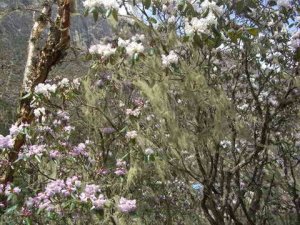 As we get closer to the end of this trek, we realize we have not seen a motor vehicle, not seen a church, nor heard a television news broadcast, nor do we know what is happening in the rest of the world. We are more worried about bathroom fixtures and how to stay warm and dry and whether we are getting enough fuel to fire up our engines so we can complete this amazing adventure. Only two more trekking days remain for the Nepal segments.
As we get closer to the end of this trek, we realize we have not seen a motor vehicle, not seen a church, nor heard a television news broadcast, nor do we know what is happening in the rest of the world. We are more worried about bathroom fixtures and how to stay warm and dry and whether we are getting enough fuel to fire up our engines so we can complete this amazing adventure. Only two more trekking days remain for the Nepal segments.